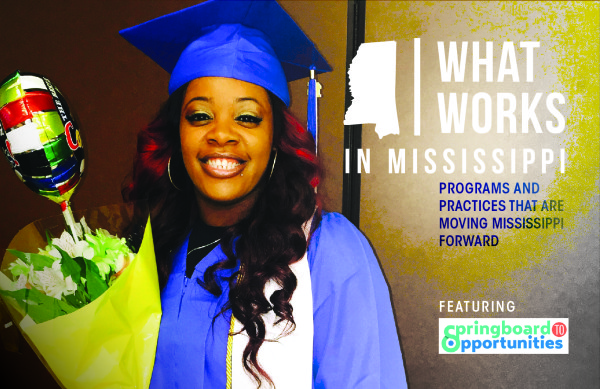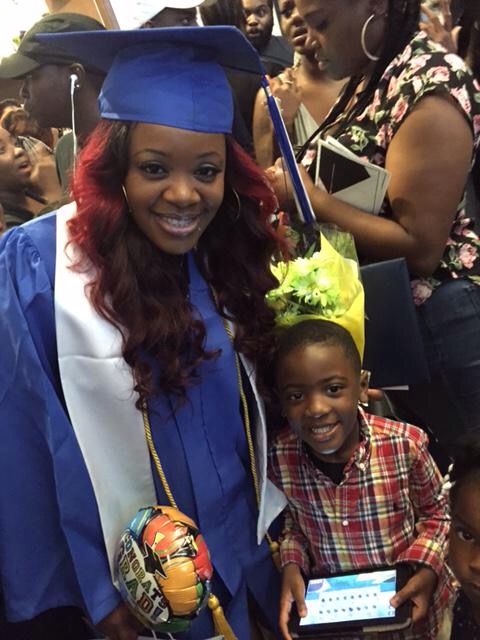What Works in Mississippi: Springboard To Opportunities
June 26th, 2015

As a state, Mississippi faces significant challenges, from high levels of unemployment to low levels of education. There are several individuals and groups working tirelessly to create a brighter future for everyone. Although we are very good at describing the issues we face, we often fall short when it comes to emphasizing solutions. MEPC wants to change that.
“What Works in Mississippi” is a blog series that highlights current issues faced by working Mississippians but, more importantly, spotlights the good work being done to address those challenges. The ultimate hope is that we help grow our collective capacity to positively affect lives in our state and continue to spur innovative and creative solutions for Mississippi’s most challenging problems.
We first highlighted the Women’s Foundation of Mississippi and continue our series with Springboard To Opportunities. Springboard is a non-profit organization located in Jackson, Mississippi, that works with residents of affordable housing to help them reach and exceed their goals in school, work and life. The organization works closely and directly with families, understanding that simply providing affordable housing alone does not create thriving communities where all residents can succeed.We interviewed Springboard’s Executive Director Aisha Nyandoro.
 Aisha Nyandoro, Executive Director | Springboard to Opportunities
Aisha Nyandoro, Executive Director | Springboard to Opportunities
1. Please describe one programmatic aspect of your organization that you believe allows you to be most effective in doing your work in Mississippi?
Springboard To Opportunities works to help families in affordable housing advance in life, school, and work. The vision of Springboard is to empower residents of affordable housing to set and achieve their personal short- and long-term goals. The model is designed to work directly with residents, helping them to identify aspirations for themselves and their families, whether they want to improve their financial situation and buy a home or give their kids the tools necessary to do well in school and have a successful career later in life. Either directly or through the development of strategic partnerships, Springboard provides the necessary supportive services and programs. Springboard’s model is unique, not only in Mississippi but in the field of affordable housing. Springboard is providing a demonstration to housing developers about the importance of resident services and programs; particularly, the importance of including residents in this process. The ultimate goal is to be a catalyst of lasting and powerful change in affordable housing communities; ending the cycle of generational poverty; and providing opportunities for families to not only articulate but realize their dreams.
The demographic of the adult population served by Springboard is predominately African American, single mothers between the ages of 19 – 40. To be responsive to the educational needs of this population, Springboard launched a program called “Cash For Caps” in 2014. “Cash For Caps” provides financial resources and support for moms interested in continuing their education via the community college system. Financial support received can be used to pay for a wide-range of items like books, supplies, tuition, childcare, transportation and/or uniforms. These are typically barriers that are not covered via financial aid. In addition to financial assistance, moms receive one-on-one education and career planning support. The overall goal is to be a resource and provide social capital. Springboard understands that for many moms there are a plethora of barriers that can prevent long-term success. By providing tangible financial support, coupled with the support of a network, we are helping moms achieve their short-term educational goals, as well as their long-term goals of financial security and economic stability for their families.
The program is allowing Springboard to address the educational and income disparities that the majority of mothers encounter in the state of Mississippi.
2. What were some of the initial needs that you saw in the state or a specific community that led you to undertake this work?
Springboard To Opportunities is built on the premise that affordable housing combined with strategic, resident-engaged services can provide a platform for low-income people to advance themselves in life, school and work. Today, more than 62,000 Mississippians live in federally subsidized housing. An affordable rent, either set at a below-market rate or at a percentage of income, is an essential step toward helping low-income people stabilize their living situations so they can move ahead in life. However, many individuals and families living in affordable housing face multiple obstacles to achieving their aspirations. For example:
- They may not have the education or experience necessary to obtain and keep a decent-paying job.
- They may be single parents with several young children without affordable child care or transportation to get to a job.
- They may suffer from mental illness, drug addiction or the aftermath of domestic violence, or they may be caring for family members with these problems.
- They may not know about – or know how to navigate – the resources in their community that could help them succeed.
- They may have language or cultural barriers preventing them from connecting with resources or succeeding in school or the workplace
Access to safe and affordable housing is a critical step toward breaking the cycle of poverty, but it is not sufficient on its own. Residents living in affordable housing also need supportive services to help overcome these challenges and achieve a more secure and hopeful future. By being “radically-resident driven” and partnering with residents in conjunction with housing developers, property management companies, and community stakeholders, Springboard is working to eliminate some of the barriers that persist in low-income communities.
3. What are some of the challenges your organization continues to face?
Springboard has been very fortunate to have funders, supporters, and partners that understand the need for resident services in the setting of affordable housing. The biggest challenge that Springboard encounters in implementing our work is empowering individuals labeled as “powerless” to realize they can affect change and that they are allowed dreams. The theory of change guiding the organization recognizes that in order to effectively implement community change solutions that will have a long-lasting impact, the individuals being directly affected must feel that their needs and wants are included in the planning process. Hence, the organization’s “radically-resident driven” approach to programming. Helping families to be empowered doesn’t occur over night, this only occurs with time, accountability, and trust. The biggest challenge that Springboard has encountered as it relates to “Cash for Caps” are for-profit universities. These institutions provide a seemingly quick fix, and for moms who want a better life immediately, the selling points are enticing (i.e., quick, help with employment etc.). Unfortunately, the financial obligation and long-term debt are typically omitted from the fine print. Springboard has to spend a significant amount of time educating our moms on why public community colleges are a much better investment in the long-term.
4. What are some of the positive outcomes your organization is seeing from the program you described in addition to community change perspective?
Overall, Springboard is seeing families develop a sense of community. Springboard is providing a platform for families to have their voices heard; families are being empowered to advocate for their needs – this is a community. Additionally, Springboard is beyond proud of the network of social support that is occurring with the moms enrolled in “Cash for Caps.” It is absolutely beautiful to watch them cheer for and celebrate each other’s accomplishments.
5. Tell us about a specific success story.
Donsahe Wilkerson will be the first graduate of “Cash for Caps”! Donshae is a single mother of two elementary-aged boys. She had tried unsuccessfully for years to complete her degree. Through the support provided by Springboard, she will receive her certification as a Dental Hygienist. Donshae is a perfect example of how financial support coupled with social capital can help families navigate barriers that could potentially impact success. Donshae used financial support from “Cash For Caps” to purchase books and uniforms that her financial aid would not cover. Additionally, the Springboard network helped her secure a mentor, an internship, and Springboard is currently assisting with her job search.






